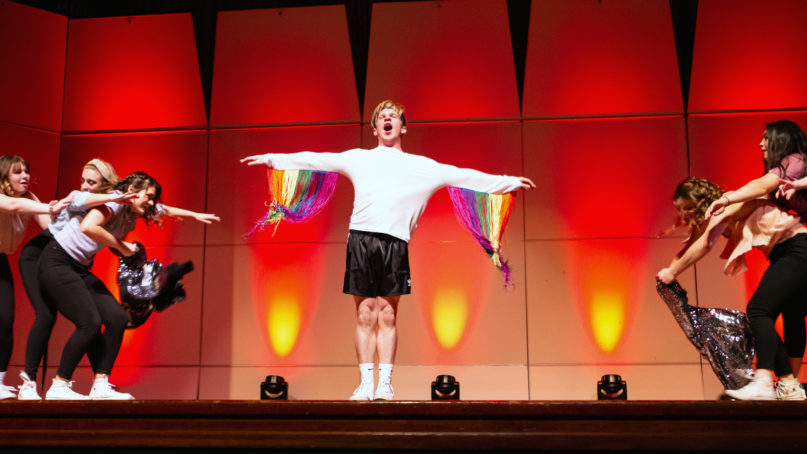(RNS) — The video begins with Reid Arthur striding on stage in shorts and a glittering, iridescent hoodie. The George Fox University senior was participating in a lip sync dance number at his school set to Taylor Swift’s “You Need to Calm Down,” complete with a troupe of backup dancers. As the auditorium speakers blasted the lyric “’cause shade never made anybody less gay,” Arthur spread his arms wide and let the dancers tear off his top, revealing rainbow-colored streamers that draped from his arms.
The audience knew exactly what that meant: Arthur had just come out as gay.
In response, the crowd of hundreds — mostly students at the Christian university — rose to offer a raucous standing ovation. Twice.
“No one could have done it better than him,” said Courtney Bither, a 2017 graduate of George Fox who identifies as queer and recently received a master’s degree from Harvard Divinity School. Like many of her fellow students and alumni of the Quaker college, she heaped praise on Arthur, describing him as “universally beloved” on campus.
RELATED: Christian higher ed can’t win the LGBTQ debate unless it transforms
Arthur, a senior theater major, is now adored far beyond the boundaries of the Newberg, Oregon, campus. Clips of his performance were shared widely on social media and chronicled in outlets such as Teen Vogue and the Advocate. It even garnered a response from Swift herself: The Grammy-winning artist tweeted at Arthur, saying, “You did the brave thing and stood up for your truth.”
But as the moment went viral, Bither and others affiliated with George Fox saw what they said was a familiar, frustrating pattern: another LGBTQ George Fox student making national news for proudly proclaiming their sexuality or gender identity, even as the school did little to alter policies she and others regard as homophobic.
“The idea that he’s going to fix this, or that this is somehow actually groundbreaking, I think misses a lot of the history of the institution,” said Bither, who was not raised Quaker but says she became “very involved” in the community during her time at George Fox.
She is one of several George Fox students and alumni who told Religion News Service that the school has long been a fraught place for LGBTQ people, including LGBTQ Christians of various stripes. As Arthur’s video sparks a new wave of activism on campus, alumni caution that tensions are long-standing at the school, with numerous clashes between students and administrators regarding LGBTQ identities and relationships that intersect with bitter schisms among local Quakers.
When asked about the controversy surrounding the video, George Fox spokesman Rob Felton noted that the university already dedicates a section of its website to “Supporting LGBTQ students at George Fox.” It affirms the “dignity of every person” and calls for civility and “better communication,” but maintains that “God has intended sexual relations to be reserved for marriage between a man and a woman.”
“This is a hard and emotional issue,” Felton told RNS in an email. “It is not an ‘us versus them’ issue, it’s a ‘we’ issue. It’s personal for everyone involved. George Fox students come from various faith traditions so we understand that they may hold different views on LGBTQ issues.”
But people connected to the school say it was only seven years ago when LGBTQ students at George Fox met secretly in the basement of the library for “Geography Club,” a code name they gave their fledgling association. The group later shifted its meetings to the attic of a local coffee shop and renamed itself Common Ground.
Daye Thomas, the current president of Common Ground and one of Arthur’s backup dancers in the video, said the group serves many purposes. In addition to offering a safe space for LGBTQ people and their allies, meetings include theological discussions about Bible verses that relate to sexuality and gender.
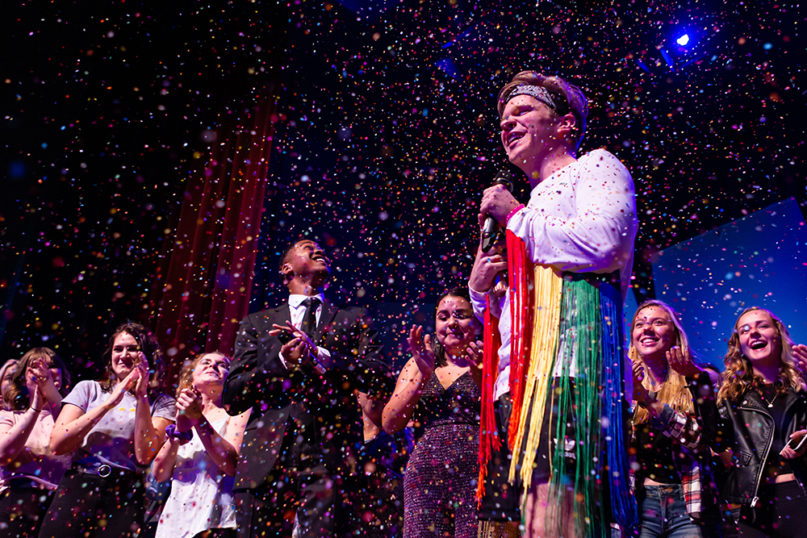
Reid Arthur, center, speaks as confetti falls at the end of the lip sync competition at George Fox University on Nov. 16, 2019, in Newberg, Oregon. Courtesy photo by Jake Morgan
“In a time and space in college where many of us are wanting to find our identities, some of whom are struggling with whether or not God even loves them, Common Ground has striven to be a space where no topic is off limits, and students can ask hard questions and find safety, resources, and love in their search for truth,” Thomas, who identifies as nonbinary and pansexual, told RNS in an email.
Finding that truth can also mean activism. Thomas recounted when A.J. Mendoza, then a George Fox junior and one of Common Ground’s founders, came out as gay during a 2012 public radio segment examining the efforts of OneGeorgeFox, a group that sought to change the school’s approach to LGBTQ relationships at the time.
Mendoza’s announcement did not trigger the same media frenzy as Arthur’s, but it did serve as the backdrop to one of the earliest examples of pro-LGBTQ activism on campus. Later that same week, George Fox hosted an “ex-gay” speaker in the school’s chapel. During the talk, a group of LGBTQ students and alumni — as well as allies — sat in the front row wearing yellow shirts emblazoned with the slogan “God loves you, gay or straight.”
“(Common Ground) applied for club status in 2012, 2013, 2014, and I think again in 2016,” said Thomas, a nondenominational Christian. “Each year we were asked for a complete list of our membership, and the school board decided not to allow CG to be a club each time.”
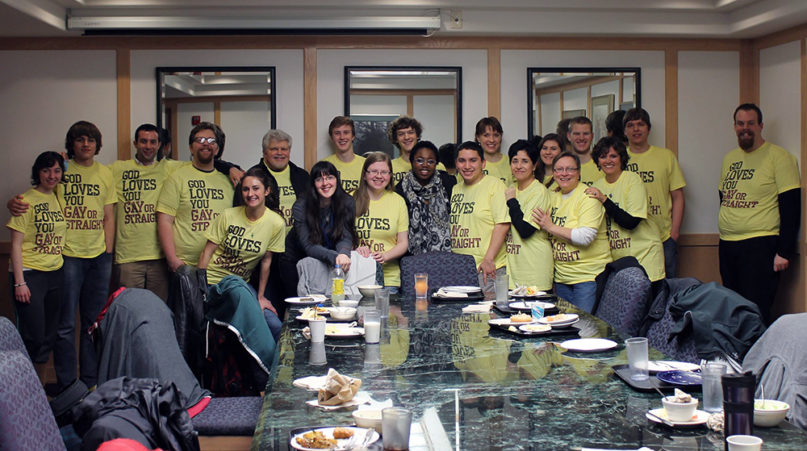
Common Ground members meet in 2012 at George Fox University in Newberg, Oregon. Courtesy photo by Courtney Bither
Others pointed to a 2014 incident in which Jaycen, a transgender student who was born anatomically female but identifies as male, asked to live in a male dorm at the school with his friends. The university refused, instead offering to let him live in a single-person apartment or in off-campus housing.
The ensuing controversy attracted national media attention, but the school defended its decision, citing its status as a Christian university and “its values surrounding modesty, sexual purity and safety.” When a local attorney threatened to file a complaint with the U.S. Department of Education, the school applied for and was granted a religious exemption to Title IX nondiscrimination policies with regard to housing and bathrooms.
Bither said there were no standing ovations when she came out in a blog post just two years ago as a senior studying religion at the school’s College of Christian Studies.
“I would get these texts from people (saying), ‘We support you, but just, like, don’t tell anyone. Sorry we can’t do more,’” recalled Bither.
George Fox’s turmoil over LGBTQ inclusion mirrors similar upheaval that has rocked its parent denomination, the Northwest Yearly Meeting of Friends. According to Matt Boswell, pastor of Camas Friends Church, which is affiliated with a different group, NWYM constitutes an affiliation of evangelical Quakers, a designation that includes skewing more conservative on issues of sexuality and gender.
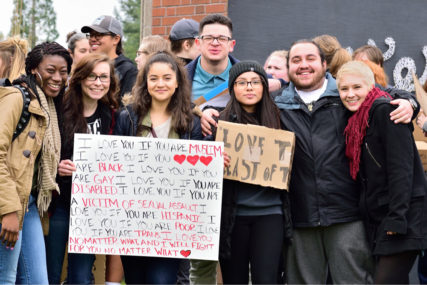
Students participate in a walkout to support inclusion at George Fox University, in January 2017, in Newberg, Oregon. Courtesy photo by Courtney Bither
Boswell, a George Fox alumnus, said controversy shook the NWYM around 2016-2017 when debate erupted over whether authorities should expel a congregation in Portland that took an affirming position on LGBTQ identities and relationships.
A section of the NWYM’s “Faith and Practice” statement reads: “We denounce, as contrary to the moral laws of God, acts of homosexuality, sexual abuse, and any other form of sexual perversion.”
Boswell’s church and others wrote letters in support of the congregation, but the NWYM ultimately expelled four worship communities with LGBTQ-affirming theology. Most excised congregations subsequently joined up with the Sierra-Cascades Yearly Meeting of Friends, a new subgroup created in 2017 that includes Boswell’s church.
“SCYMF was formed in July 2017 with the explicit intention of being Quaker, Christ-centered, and inclusive — committed to the full participation of LGBTQ+ folks in the life of our Quaker communities, including as pastors of our meetings and clerks of our committees,” Boswell told RNS in an email. “This denominational split was at times ugly and painful, and certainly a lot of the people who are long-time members of the NWYM have experienced a lot of grief over this shattering of what was a family to many … But I would say that queer folks are the ones most victimized by this struggle, even as you can see the potentially liberating nature of the whole divide.”
Boswell said the debate still looms large over George Fox.
“I suspect a mix of loyalty, history, funding, and personal bias/beliefs keeps the two — GFU and NWYM — wedded together,” he said.
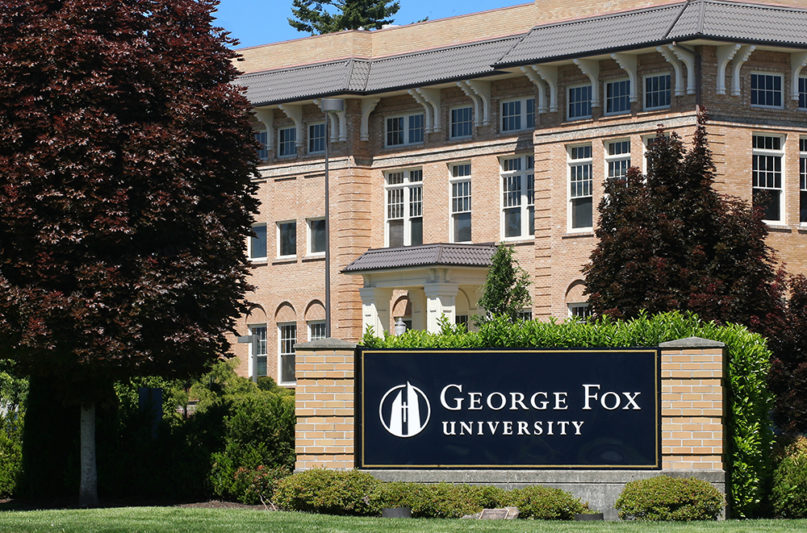
The George Fox University campus in Newberg, Oregon. Photo courtesy of George Fox University/Creative Commons
Back at George Fox, graduate student Abigail, who did not wish to reveal her full name, hopes a new flurry of activism sparked by Arthur’s video will convince administrators to address the concerns of LGBTQ students.
It was hardly a year ago when Abigail came out as bisexual during her senior year as a George Fox undergraduate. She said that when her church found out, she was promptly kicked off the worship team. The next day, she attempted suicide on campus.
In her time of struggle, Abigail said, it was university faculty who lifted her up.
“It was only because I had affirming faculty who I knew I could reach out to that I made it through that,” she said.
She thought of those professors while sitting in the audience the night of Arthur’s performance and observing the glowing response. When she got home, Abigail — who was raised evangelical and currently attends a “queer Lutheran church” — posted a message to Facebook calling on the administration to participate in a robust discussion on LGBTQ issues.
“I would encourage the GFU leadership to look at the response of the audience and the community tonight and consider what message they are sending through their own reactions and policies,” she wrote. “If you, the GFU administration, continue to suppress this conversation, you are actively supporting a system that doesn’t let students be known, that increases suicides, and makes campus unsafe for students.”
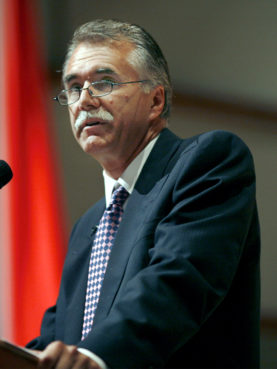
Robin Baker, president of George Fox University, in 2008. RNS photo by Motoya Nakamura/The Oregonian
Her message was shared widely and aided an activist surge, which eventually garnered a response from school President Robin Baker. He noted the university is “a Christian community that holds that God intended sexual relations to be reserved for a marriage relationship between a man and a woman,” but he added, “There is space at George Fox for disagreement.”
Abigail fired back in another Facebook post, arguing that school policy still bars faculty at the school from publicly endorsing same-sex marriage or affirming LGBTQ relationships.
“What does making space for disagreement in this area look like at GFU?” She wrote.
Meanwhile, Bither helped draft an open sign-on letter for students, alumni and supporters. It referred to the president’s letter as an act of “bullying” and pointed to the diversity of religious belief among Quakers.
“Many Quakers (many former members of the NWYM) do not agree with GFU’s statement on gender and sexuality,” read the statement. “It is disingenuous to appeal to the NWYM statement on sexuality as though it were universally accepted within the Quaker community.”
The statement now boasts hundreds of signatures from students and alumni from the university, the College of Christian Studies and George Fox’s affiliated seminary — including Boswell and Thomas. It was also bolstered by a bold profession of support for Arthur by George Fox’s student government.
“We, as the ASC Executive Council, want to be as explicitly clear as possible that we affirm LGBTQIA+ students in particular and all students in general,” read the email, according to Teen Vogue. “Each person is created in the divine image of God that we hold as paramount to our mission. We exist to serve, love, and provide for a student body that welcomes and cherishes each member of the community.”
When Bither read the student government’s statement, she texted fellow alumni in disbelief.
“When I was there, the student body would have never released a statement — I mean, never,” she said. “None of us, even from three years ago, could imagine the student body being that supportive.”
It’s unclear how George Fox’s administration will respond to the groundswell. Thomas said school officials have offered to host two “Quaker style” panels about LGBTQ inclusion, but that members of Common Ground are preparing to host sit-ins and other demonstrations if administrators don’t address a list of requests prepared by students.
Activists also continue to lobby university leadership to recognize Common Ground as an official club. Thomas said alumni and students are selling rainbow-colored shirts adorned with slogans such as “God is Love” and donating the proceeds to the group.
Felton did not respond to direct questions about the administration’s future plans. Instead, he shared a note Baker sent to faculty on Nov. 22, in which the school president described Arthur as a “talented and very fine young man” and said that officials will “continue to hold conversations with student leaders on how to best support our LGBTQ students.”
For her part, Abigail said simply allowing professors to affirm LGBTQ people and relationships publicly could make a world of difference to students who feel isolated simply because of who they are.
“I don’t even ultimately need (the school’s position on sexuality and gender) to change so much as allow professors to be able to be supportive, because without those connections, people are literally dying,” she said. “I love George Fox, and I just want to see them take care of their students better.”
